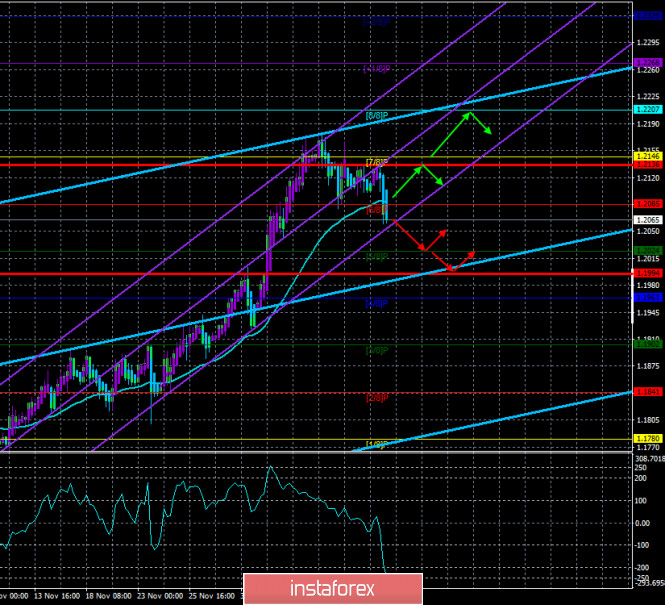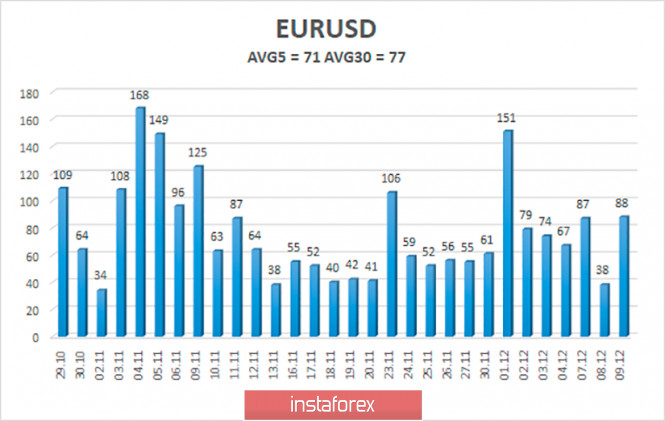4-hour timeframe

Technical details:
Higher linear regression channel: direction - upward.
Lower linear regression channel: direction - upward.
Moving average (20; smoothed) - sideways.
CCI: -236.3704
The third trading day of the week for the EUR/USD pair was again too quiet. The pair's volatility has fallen quite a lot in recent days, and the price cannot work out the moving average line within three trading days within the correction, which initially had to be reached by no more than 85 points. But in three days, the bears failed to lower the pair by 85 points. This is all you need to know about the strength of sellers at this time and their desire to trade lower. Thus, if nothing changes in the coming days (looking ahead, it may change), then most likely, despite the fundamental background, the upward movement will resume. The US currency continues to be under serious market pressure, although there are still no visible reasons for this.
Meanwhile, the EU summit starts today, where many important issues will be resolved, as usual. If earlier EU summits attracted the attention of traders because of the UK and Brexit, then times are changing and the EU is now full of its problems. Of course, it was the "coronavirus" epidemic that revealed many of them. Initially, there were huge problems with the formation of the recovery fund. Even earlier, the European Union wanted to use "coronabonds" to raise funds to finance the most affected sectors of the economy. But this idea failed. With grief in half, the EU countries failed to approve the recovery fund and the method of financing and distribution. All this time, rumors were actively spread that Italy would be next in line to leave the EU. And now, at the end of 2020, Poland and Hungary have vetoed the adoption of the seven-year budget and the recovery fund. We have repeatedly discussed the essence of the problem. Warsaw and Budapest do not agree with the new mechanism for allocating EU finances following the rule of law. If at first everything looked like a bluff, and many European officials said in plain text that Poland and Hungary just want to get more profitable financing from both funds, now everything looks not so simple. The European Union officially sent requests to leaders Mateusz Morawiecki and Viktor Orban to withdraw their veto, however, both leaders refused. Earlier, both leaders wrote a joint declaration, which they sent to the European Union. The whole point of this declaration is its fifth point: "Our goal is to prevent the creation of a mechanism that does not strengthen, but undermines the rule of law within the EU, turning it into a political tool. The proposed rule of law mechanism circumvents the Treaty, uses vague definitions and ambiguous terms without clear reasons why sanctions may be applied, and does not contain meaningful procedural guarantees." Both leaders emphasize that they are working to solve the current problem so that all EU members can get access to funding as quickly as possible. However, in fact, this means a "tough" position of the troublemaking countries in negotiations with EU leaders.
Hungarian and Polish political analysts believe that the EU uses the mechanism of budget control very selectively. As an example, many cite the situation when Jean Claude Juncker (former head of the European Commission) refused to launch an investigation against France because of violations of budget rules. However, a little later he started proceedings against Italy, in which more and more eurosceptics have recently appeared in the government. In other words, according to political analysts, the European Union only opposes those countries that do not support the EU's policies. Also, political scientists of the two troublemaking countries believe that most of all serious decisions should be made only by consensus (that is, the approval of all 27 EU member states), and not by a majority. The leaders of Poland and Hungary themselves consider the new EU mechanism "politically motivated" and which threatens to break up the entire European Union in the future. The Polish Prime Minister believes that "enforcement of the order should concern the budget, but concerns other matters that are not related to the budget". "The German presidency did not fulfill the July agreements," Mateusz Morawiecki said. "We don't want the EU to go off course. And this course should take into account that 27 countries have 27 different legal norms, traditions, and perceptions of the future. These are diverse values and they need to be respected and appreciated," Morawiecki added.
But some European deputies are more optimistic and believe that the budget crisis will be overcome. Many of them believe that Angela Merkel (Chancellor of the German presidency) will be able to find the right words to hold successful negotiations with both sides of the conflict. At the same time, MEPs believe that if this conflict cannot be resolved, it may indeed be the beginning of the end of Europe. Others stress that the EU must continue to remain united, which will be impossible if the conflict with Poland and Hungary cannot be resolved. For some EU countries, this may be a bad example. An example of the fact that the unity and integrity of the EU is no longer the main value and any decision or proposal can be vetoed if it does not suit a certain country. But being in the union also means making concessions, otherwise, the European Union could not exist in principle.
Thus, the situation is really difficult, but not a stalemate. Still, the budget can be accepted, and Poland and Hungary can be persuaded. The question is, which way will the EU go? This week we can find out the answer to this question. In the meantime, the price continues to be located above the moving average line, so the upward trend remains, and therefore it is recommended to continue trading on the increase. However, in recent days, the pair is in a very narrow price range, and its volatility has decreased significantly. And in such conditions, in principle, it is very difficult to trade. However, in the last two trading days of the week, market participants may become more active, however, there will be a lot of important events (do not forget about the meeting of the European Central Bank, where important decisions can also be made).

The volatility of the euro/dollar currency pair as of December 10 is 71 points and is characterized as "average". Thus, we expect the pair to move today between the levels of 1.1994 and 1.2136. A reversal of the Heiken Ashi indicator to the top signals a new round of upward movement.
Nearest support levels:
S1 – 1.2024
S2 – 1.1963
S3 – 1.1902
Nearest resistance levels:
R1 – 1.2085
R2 – 1.2146
R3 – 1.2207
Trading recommendations:
The EUR/USD pair continues to adjust and overcome the moving average. Thus, today it is recommended to stay in sell orders with targets of 1.2024 and 1.1994 until the Heiken Ashi indicator turns up. It is recommended to consider buy orders if the pair is fixed back above the moving average, with targets of 1.2136 and 1.2207.
The material has been provided by InstaForex Company - www.instaforex.com